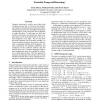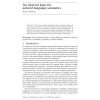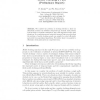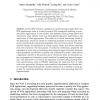119
click to vote
UAI
2003
15 years 4 months ago
2003
This paper examines a number of solution methods for decision processes with non-Markovian rewards (NMRDPs). They all exploit a temporal logic specification of the reward functio...
130
Voted
NIPS
2003
15 years 4 months ago
2003
We show that temporal logic and combinations of temporal logics and modal logics of knowledge can be effectively represented in artificial neural networks. We present a Translat...
91
Voted
AAAI
2006
15 years 4 months ago
2006
One important aspect in directing cognitive robots or agents is to formally specify what is expected of them. This is often referred to as goal specification. Temporal logics such...
114
Voted
IJCAI
2007
15 years 4 months ago
2007
Temporal reasoning is widely used within both Computer Science and A.I. However, the underlying complexity of temporal proof in discrete temporal logics has led to the use of simp...
147
Voted
AIML
2008
15 years 4 months ago
2008
Most temporal logics, particularly interval temporal logics, are not expressive enough to capture meanings of natural language constructions, and they are not convenient to represe...
148
click to vote
MOVEP
2000
15 years 6 months ago
2000
We survey principles of model checking techniques for the automatic analysis of reactive systems. The use of model checking is exemplified by an analysis of the Needham-Schroeder p...
137
Voted
KR
2000
Springer
15 years 6 months ago
2000
Springer
When reasoning in description, modal or temporal logics it is often useful to consider axioms representing universal truths in the domain of discourse. Reasoning with respect to a...
122
Voted
AMAST
2004
Springer
15 years 6 months ago
2004
Springer
Since Z, being a state-based language, describes a system in terms of its state and potential state changes, it is natural to want to describe properties of a specified system also...
120
click to vote
CONCUR
2003
Springer
15 years 7 months ago
2003
Springer
We consider the problem of checking whether a finite (or ultimately periodic) run satisfies a temporal logic formula. This problem is at the heart of “runtime verification” ...
125
Voted
ICWE
2005
Springer
15 years 8 months ago
2005
Springer
As the Web becomes a platform for implementing complex B2C and B2B applications, there is a need to extend Web conceptual modeling to process-centric applications. In this context,...




